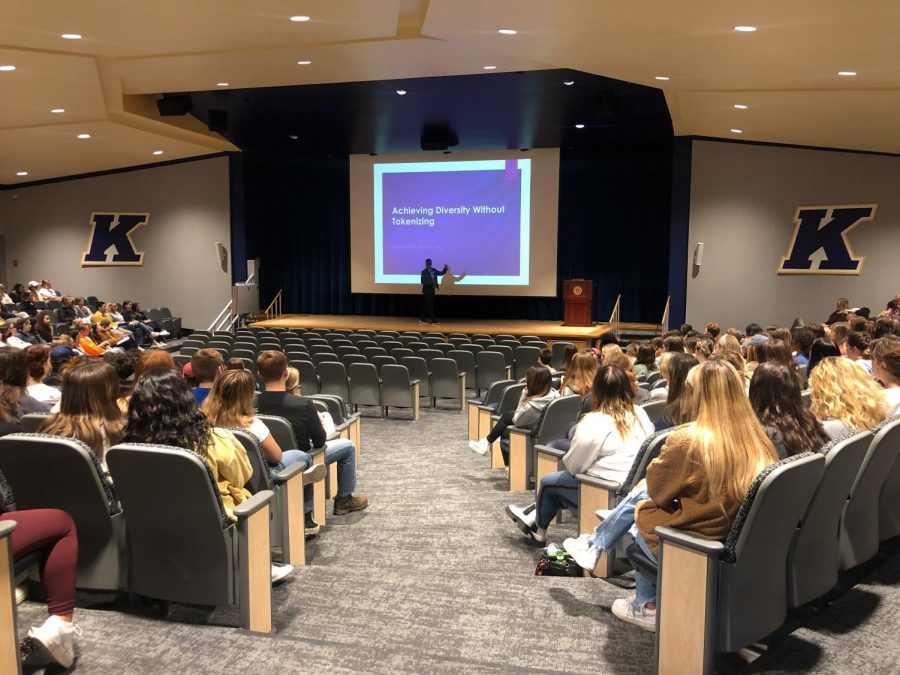Keynote Speaker Eboné Bell encourages students to create inclusive, diverse spaces on campus
Eboné Bell gives a presentation on achieving diversity without tokenizing in the Kiva on Tuesday, March 15, 2022. Bell spoke to students after being invited to the event organized by Kent State’s Undergraduate Student Government and Panhellenic Council.
“Diversity is the future. That is a fact. You will not be able to get away from that.”
Eboné Bell, a social justice activist, spoke these words to Kent State students in the KIVA Tuesday during a presentation on diversity and tokenism on college campuses.
As the founder of the LGBTQ+ publication Tagg Magazine and representative of CAMPUSPEAK, Bell travels to different universities across the country to give lectures to students on a variety of social justice issues.
“I love having conversations around diversity, allyship,” Bell said at the start of her presentation. “When I see people in your generation actually [wanting to] have these discussions, it gives me a lot of hope for our future.”
During her hour-long presentation, Bell defined diversity as differences such as race, gender and sexuality. She also gave examples of how organizations such as sororities can work with marginalized groups on campus in order to increase inclusion and support.
Specifically, Bell said members of sororities might join with campus clubs to host a fundraising event for LGBTQ+ youth, or maybe for the homeless.
“What are you doing with people who don’t look like you?” Bell asked the audience.
About ten minutes into the presentation, Bell introduced her main topic: tokenizing.
Bell defined tokenizing as “Selecting someone based off of some identifier: race, gender, sexuality, ethnicity, filling whatever gap you need to fill.”
The concept around tokenism is the exploitation of others’ differences as a way to make a company, brand or organization appear to be inclusive without actually putting in the effort to actually create a more welcoming environment, Bell said.
“When we talk about diversity, it can be gender, yes, it can be race, it can be physical disability,” she said. “It’s all of our differences.”
She also defined the difference between intention and intentionality, where the former focuses on passive actions, such as grocery shopping, and the latter involves more deliberate action.
“I literally write out my day, hour to hour,” she says. This is an example of being intentional, where an individual has specific goals in mind.
During the later parts of her presentation, Bell spoke on five different ways to reach goals related to diversity. These include
- Partnerships
- Interacting with key leaders
- Changing one’s language, in other words, speaking in a way that’s inclusive of all people
- Identifying problems and coming up with solutions
- Asking questions and listening to others
She also said how creating more diverse, accepting environments is “a scary conversation to have, but you have to have it.”
By having these tough conversations, organizations can strive for a more inclusive, accepting environment, Bell said.
Bell emphasized the importance of the fourth step, identifying problems and finding solutions, and the effect it has on creating inclusive, diverse spaces.
“I need you all to stop being complicit,” Bell said. “Because you’ll never find the answer you’re looking for.”
Around 8:15 p.m., Bell concluded her presentation, allowing anyone with questions to speak with her directly before leaving.
“This is where change happens, is in conversations,” Bell said.
Morgan McGrath is a reporter. Contact her at [email protected].



